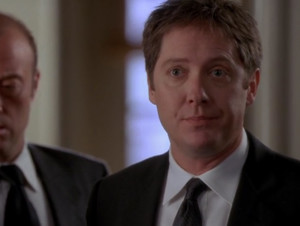Res Ipsa

James Spader as Alan Shore in Season 8, Episode 9 of The Practice, “Victims Rights”
This is Latin for “the thing itself.” It doesn’t make much sense on its own, but it’s usually used in the context for “res ipsa loquitur,” which translates to “the thing speaks for itself.”
This is a legal principle which claims, “What has happened requires no proof or argument. It is true just because it exists.”
It’s used to describe when something has happened which no reasonable person can argue should have happened, and therefore someone is liable for damages.
For example:
If a patient has tools left inside them after surgery. This is not something that really needs to be argued – if a pair of forceps is found inside someone’s abdomen, then that thing speaks for itself. Fault is automatically proven because any reasonable person agrees this type of thing shouldn’t happen, and we can just discuss damages.
If two trains crash into each other, fault is automatically assumed – at least, we know that the fault doesn’t like with the passenger, who couldn’t possibly have done anything to cause the crash. Two trains on the same track heading in opposite directions is sufficient proof by itself that someone made a mistake.
Why I Looked It Up
I saw a video clip a couple of times from an episode of The Practice. Here’s the entire episode, and the scene occurs immediately at the beginning – the first two minutes.
In the scene, a young girl approaches a lawyer in a courtroom and asks for his help to prevent her from having to return to Romania where she is at risk of child marriage. The lawyer turns to the judge and says:
Excuse me, I hate to interrupt but this one’s urgent, your honor. Alan Shore representing… Anna Vyorka, a petition for political asylum, res ipsa ____
The last word is either “doozy” or “duce.” He pronounces it with a distinct “z” sound, but that could just be James Spader’s particular diction in pronouncing “duce.”
If “doozy” then he was saying something to the effect of “the thing itself” (meaning, I suppose, the girl in this case) is a “doozy,” meaning an weird and unique problem (that’s a slang idiom stemming from the nickname of the Deusenberg automobile of the 1930s).
If “duce” then he’s saying “the thing itself is a guide,” which might be another way to say that girl will explain what the problem is. I didn’t find this as an actual legal principle, but “duce” is “guide” in Latin, and so “res ipsa duce” does translate directly.
I looked up both a script and a closed caption transcript of the episode. Unhelpfully, one of them had “duce,” one had “doozy.”
Searching for either of those doesn’t return much. Several results came back for “res ipsa loquitur,” which is the major context in which we see the prefix “res ipsa.”
Honestly, the line seems odd. It requires some inside knowledge to understand, and even then it’s vague.